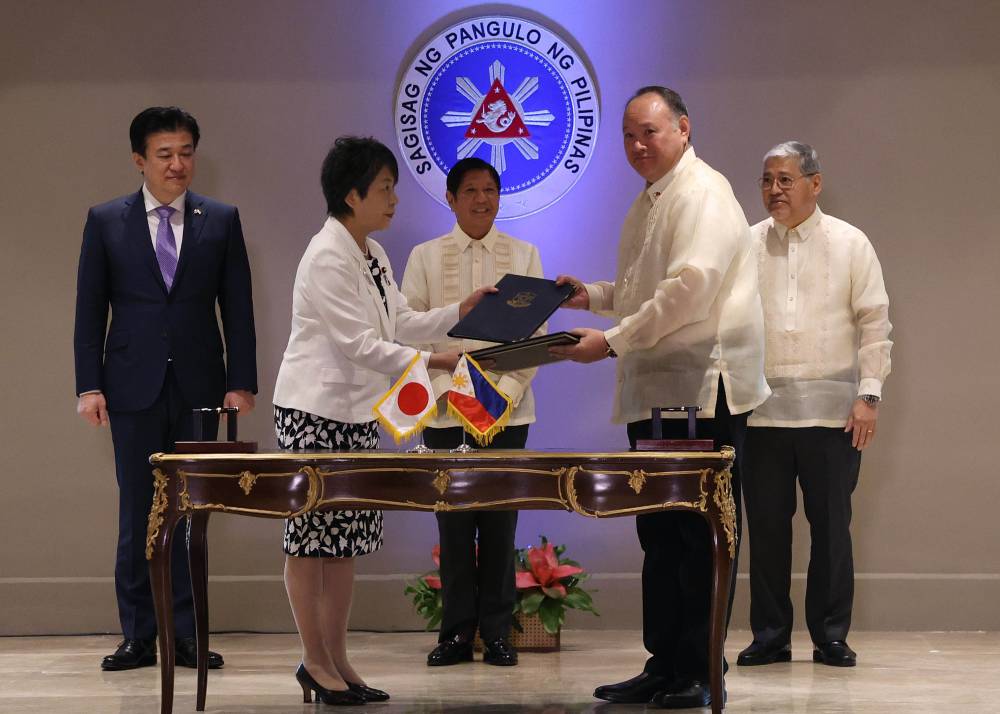PH-Japan access accord shows new era in defense cooperation – Romualdez

President Ferdinand R. Marcos Jr. (center) witnessed the ceremonial signing of the Reciprocal Access Agreement between Japan Foreign Minister Yoko Kamikawa (left, front row) and Defense Sec. Gilbert Teodoro Jr. (right, front row) during a courtesy call in Malacanang on Monday, July 08, 2024. With them are Japanese Defense Minister Kihira Minomura and Foreign Affairs Sec. Enrique Manalo. (Photo from INQUIRER/ MARIANNE BERMUDEZ)
MANILA, Philippines — The recently signed Reciprocal Access Agreement (RAA) between the Philippines and Japan signifies a new era in defense cooperation amid different regional challenges.
House Speaker Martin Romualdez said on Tuesday that the RAA is important in enhancing “mutual defense capabilities” and “fostering deeper strategic ties” between the two countries.
“The signing of the RAA signifies a crucial moment in Philippine-Japan relations, heralding a new era of strengthened defense cooperation amid evolving regional geopolitical challenges,” he noted.
“The RAA highlights our shared commitment to regional stability and security, strengthening our defense capabilities, and reaffirming the Philippines’ strategic partnership with Japan,” he added.
Both countries signed the RAA on Monday in a ceremony at Malacañang.
Article continues after this advertisementThe Philippine side was represented by Defense Secretary Gilberto Teodoro Jr. while Japanese Foreign Minister Kamikawa Yoko signed for Japan.
Article continues after this advertisementPresident Ferdinand Marcos Jr. witnessed the event.
READ: Philippines, Japan sign reciprocal access agreement
The agreement will now be submitted to the two countries’ legislators — the Senate, in the case of the Philippines, for ratification.
Under Article VII, Section 21 of the 1987 Constitution, treaties and international agreements will not be valid and effective “unless concurred in by at least two-thirds of all the Members of the Senate.”
The RAA is similar in many ways to the Philippines’ Visiting Forces Agreement (VFA) with the United States, as troops will be allowed to visit and vice versa for exercises and shared training.
“This agreement reflects our shared values of peace, stability and prosperity in the region,” Romualdez said.
“It underscores the Philippines’ proactive approach in addressing security challenges and promoting a rules-based international order.”
Negotiations for the deal were being discussed even before Marcos went to Japan for his first visit as President in February 2023.
Formal talks were held in Tokyo from November 29 to 30, 2023.
Injustice for war victims
Other House lawmakers observed this RAA comes even if Japan has not fully atoned for its war crimes.
According to Gabriela Party-list Rep. Arlene Brosas, allowing Japanese forces access into the country again without the proper acknowledgment of the war crimes Japan committed in the Second World War is an injustice to many victims.
“The RAA, which was negotiated in secret, is essentially another Visiting Forces Agreement that will allow Japanese Self-Defense Forces to participate in military exercises in the Philippines, primarily the US-PH Balikatan,” Brosas said.
“We must not forget the historical context of this agreement. Japan has yet to fully atone for its wartime atrocities, particularly the systematic abuse of comfort women,” she stressed.
“Kaya hindi makatarungan na papapasukin muli ng gobyerno ang mga sundalong hapon na para bang walang dumanak na dugo nang sumalakay sila dito noon,” she added.
(That’s why it is unjust for the government to allow Japanese forces access here as if there was no bloodshed when they attacked us before.)
READ: Marcos, Biden, Kishida to China: Stop ‘coercive use’ of vessels
When the Second World War broke out, the Philippines was a colony of the United States — which made the Philippines the target of Japan.
Even if Manila declared itself to be an open city on December 26, 1941, Japan still bombed the Philippine capital, causing intensive fires and damage.
READ: DID YOU KNOW: Manila declared Open City in World War II
Hundreds of Filipino women were also sexually abused by the Japanese forces, which gave rise to the term “comfort women.”
At present, all three countries — the Philippines, the United States, and Japan — consider themselves to be strong allies.
Last April, the first-ever trilateral summit between the three countries’ leaders was held in Washington D.C.
They issued a strong statement condemning China’s intrusion into the Philippine territories.